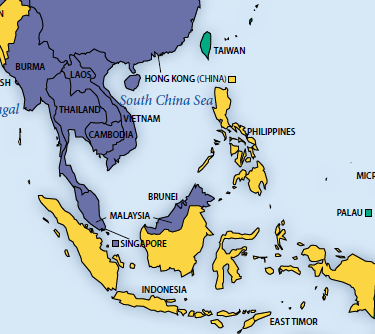“Every person has the right to freedom of opinion and expression, including freedom to hold opinions without interference and to seek, receive and impart information, whether orally, in writing or through any other medium of that person’s choice.” – ASEAN Human Rights Declaration
As President Obama visits the capital of Myanmar on November 12th and 13th to attend the US-ASEAN Summit, he will meet with leaders of a region where freedom of expression and the media (not to mention democracy) are in serious trouble.
Although enshrined in ASEAN’s 2012 human rights declaration, freedom of expression is uneven and poorly protected throughout the regional bloc. Indonesia and the Philippines still boast dynamic, if flawed, democratic societies, but backsliding in Thailand, stilted reform in Myanmar and continued one-party dominance in Cambodia, Vietnam and Laos creates a stifling climate for independent media and freedom of expression activists in much of the region.

Only Indonesia, Timor-Leste and the Philippines avoided Freedom House’s purple “not free” rating.
The world’s fifth special rapporteur on freedom of expression?
Last year, during the 15th ASEAN Intergovernmental Commission on Human Rights (AICHR) in Pnomh Penh, Cambodia, the Canadian Journalists for Free Expression (CJFE), IFEX, and others called on ASEAN to do more to protect human rights in the region. The statement most notably called for the establishment of a “special rapporteur for freedom of opinion and expression” who would “provide a bridge between civil society and governments.”
A special rapporteur on freedom of expression for ASEAN has also been endorsed by the United Nations Special Rapporteur on Freedom of Expression and would become the 5th such figure in the world, following the United Nations (UN), Organization of American States (OAS), African Union (AU) and The Organization for Security and Co-operation in Europe (OSCE).
What could a special rapporteur actually accomplish?
A recent report by Internews Europe, entitled “Freedom of Expression and Right to Information in ASEAN Countries,” suggests that a lack of “systemic collaboration” between freedom of expression proponents both within and between countries of ASEAN undermines the prospect for greater protections, particularly on critical issues such as the rise of restrictive media laws, censorship, impunity, and disparity of access to research and best practices.
To this end, a special rapporteur on freedom of expression could be a vital networking resource or “bridge” for media and freedom of expression activists across the region. By providing a hub for scattered and disconnected activists, a special rapporteur could help promote best practice-sharing and collaboration to strengthen the freedom of expression community and independent media sector across the region. Furthermore, the establishment of such an envoy would help lend credibility to the region’s oft-lamented human rights declaration by demonstrating ASEAN’s concrete commitment to freedom of opinion and expression.
Where does ASEAN leadership stand on freedom of expression?
In order for the establishment of a special rapporteur for freedom of expression, ASEAN needs leadership to emerge from within the bloc but the ASEAN tradition of non-interference in domestic affairs often impedes such leadership on politically sensitive issues.
As ASEAN inches closer to a political, economic, social and cultural community by the end of 2015, the role of media will be crucial in supporting such integration. This in turn could provide impetus for regional leaders to push for further support for freedom of expression and media.
As Thai political commentator, Kavi Chongkittavorn, notes in a recent column in The Nation, “The [ASEAN] charter and other key documents stipulate clearly the role of media in promoting and raising ASEAN awareness, a sense of community and supporting ASEAN identity building efforts.” A special rapporteur could be one important step in this direction.

Comments (0)